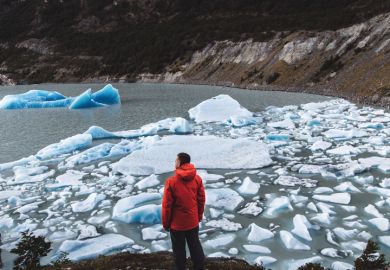Universities are beginning to introduce compulsory courses on climate change, but although the cause is uncontroversial, pitching content at the right level and crowbarring it into other programmes is proving tough.
France has pioneered mandatory climate education. In October 2022, higher education minister Sylvie Retailleau said every undergraduate in the country must finish their course with some understanding of Earth’s “ecological transition”, setting a 2025 deadline for the rollout, but leaving the details to universities.
Audrey Harroche, a postdoc sociologist at Oxford Brookes University who has studied the rollout as part of a project at Sciences Po, told Times Higher Education that at least five French universities were already teaching mandatory climate classes, which are typically credit-bearing and delivered online.
Campus resource: Making sustainability part of university DNA
While these young courses had ruffled the feathers of some environmental scientists, who felt their academic territory had been intruded upon, she said, the biggest challenges had been administrative, with no extra resource provided to develop the interdisciplinary material and some issues fitting them around existing teaching schedules. “You have to put together a course that is understandable for all the students,” she added.
Elsewhere in Europe, compulsory climate courses are germinating through grassroots effort. A petition from the Netherlands, “addressing the elephant in the lecture hall”, calls on university heads to introduce mandatory courses as a “first step” in fulfilling their duty to educate on the crisis, and has more than 1,400 signatories.
Koen Lemaire, an assistant professor in biomechanics at Vrije Universiteit Amsterdam (VUA), is a campaigner for the courses. As with Dr Harroche’s preliminary study in France, he found students tended to welcome the teaching, based on a workshop given during a freshmen introduction week.
“Students almost seem relieved when you bring the topic up in a serious manner, when you say: ‘We’re going to sit down and talk about this, like what it means for us, how we feel about this,’” he said.
He said the idea of compulsory classes had been similarly welcomed, in principle, during meetings with VUA leadership, but that the executive board was yet to release budget or other resources to make the courses a reality. For now, Dr Lemaire and other campaigners are leafleting and looking for external funding.
He said he would also like to integrate climate-relevant content into his biomechanics teaching, including critiques of the economic and governmental systems that had contributed to the crisis, but said that had proved more difficult.
Among colleagues who complained about the idea of compulsory courses, the most common issue was the relevance of the climate and ecological crises to their classes, he said, while others chafed at the idea their curriculum should be defined by any outsiders, even with the best intentions.
Dr Lemaire said the issue should be considered foundational for all studies, with a stable climate a precondition for all other human activity. He compared climate knowledge to basic statistics, which is not mandated but accepted as a necessary part of many programmes.
In Spain, the University of Barcelona plans to introduce mandatory climate courses for all students in the 2025-26 academic year, although a spokesperson told THE the details were yet to be decided.
Basic climate studies have been introduced as a requirement for all undergraduate programmes in India from this academic year, while a new university in Wales dedicated solely to climate studies is set to admit its first bachelor’s students this September.
“It’s the start of the academic year, so I don’t know exactly how I’m going to do it, but I’m teaching a course now and I am intending to reserve one lecture for this topic,” said Dr Lemaire.
Register to continue
Why register?
- Registration is free and only takes a moment
- Once registered, you can read 3 articles a month
- Sign up for our newsletter
Subscribe
Or subscribe for unlimited access to:
- Unlimited access to news, views, insights & reviews
- Digital editions
- Digital access to THE’s university and college rankings analysis
Already registered or a current subscriber? Login








